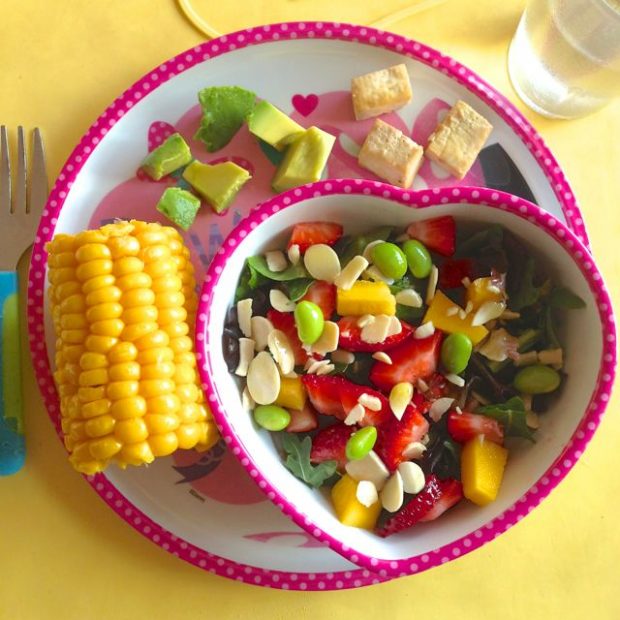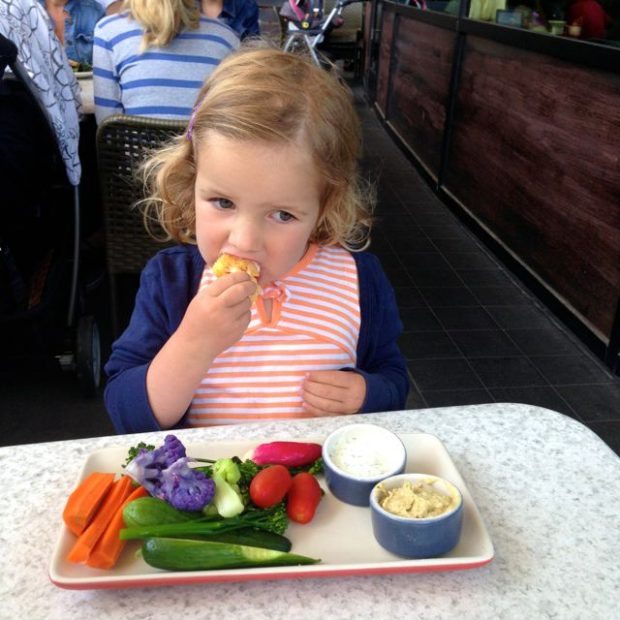Wouldn’t it be nice if you could cook something for dinner, put it on the table, and watch all your family members happily eat it?
Yeah, right!
Though Lucy is only three years old, she rarely comes to the table without an opinion about the foods I’ve prepared. Getting her to try new foods can be challenging, as can ensuring she eats adequate amounts of protein and vegetables: the two food groups we struggle with the most. And she’s not even that picky.
But I’m not giving up.
Even when feeding challenges arise, I know there are things I can do to foster good long-term eating habits – and that’s really what we parents are after.
Below are some of the strategies I do and don’t recommend when it comes to handling pickiness in kids.
The Do’s:
- Do introduce new foods frequently, and gently encourage your kids to try them via these methods.
- Do eat a wide variety of foods yourself, since your eating habits will heavily influence theirs, eventually.
- Do involve your kids in healthy food preparation. Even if it’s just stirring up the dip you’re serving with carrots, they are much more likely to eat something they helped to make.
- Do make food fun, by allowing kids to help choose the produce you buy and/or cutting foods into cute or dip-able shapes.
- Do think about kid appeal. The size, shape, texture and color of foods can play just as big of a role in acceptance as the flavor. Pay attention to what your kids do like, and try serving other foods in a similar format.
- Do limit snacks between meals. Kids who come to the dinner table feeling hungry will try and eat much more than kids who are only a little bit hungry.
The Don’ts:
- Don’t force your kids to eat. This can backfire, and it’s more important to preserve positive feelings about mealtime.
- Don’t serve milk, juice, or any other caloric beverage with dinner. These drinks are filling and leave less room for healthy foods.
- Don’t lecture your kids about why eating healthy is important. Children’s brains can’t connect their current behaviors with long-term consequences or benefits.
- Don’t reward healthy eating with treats. If you choose to give your kids dessert sometimes, it should be independent of what they did or didn’t eat for dinner. [Tip: Dessert can be healthy too! Try plain yogurt drizzled with honey, chopped fruit & a few chocolate chips. Or whip up a fruit dip and serve alongside a platter of ripe, sliced fruit.]
- Don’t allow your kids to snack after dinner (on things other than dinner foods). Instead, save what they didn’t eat at dinner and offer it later when they say they’re hungry. Or develop an after-dinner snacking policy, such as only fruit & veggie-based snacks allowed after dinner.
- Don’t freak out. Even the pickiest kids will begin to explore more foods over time, when provided with a healthy environment and a supportive family.
Remember, these are just guidelines, and even the most dedicated parents won’t follow them all the time. If you’re offering a wide variety of food and your home is a healthy food environment most of the time, pat yourself on the back and rest assured that over time, mealtime will get easier 🙂









5 Comments
Emily @ Zweber Farms
June 18, 2014 at 7:32 amGreat tips! We have a 7, 5 and 3 year old, so we are right in the thick of picky eating. Another tip I have is to make everyone your kids eat with regularly are on board too. For example, our kids happily ate pizza with mushrooms until a loving aunty shared that “Mushrooms are gross on pizza.” Instead, of labeling foods yummy/good or yucky/bad talk about how some people like some foods and some people don’t like others. It is okay to not like a food and it is okay for someone to like a food you don’t like.
Also, encourage your kids to use a variety of describing words to describe why they do or don’t like a certain food. You might learn that your kids don’t like cold foods or squishy foods, etc.
Amelia Winslow
June 18, 2014 at 12:20 pmSo true that many others influence our kids’ food preferences, which can be good or bad. And I love your tip about specific words to describe what a child likes or doesn’t like – so helpful!
Emi
December 13, 2014 at 10:20 pmWe are struggling with this now with my three-year-old! My twenty-month-old will eat almost anything, my six-year-old does okay most of the time, but my three-year-old is stubborn. He will not try something if he doesn’t like the way it looks or smells (which seem to be a LOT of things). I will confess I have slipped into the “don’ts” in desperation more than I would like to admit. 🙂 Thanks for the tips and reminders!
Karrie Boudreau
December 17, 2014 at 6:39 amThanks for these very practical and helpful tips. We use several of them but there are also several we need to put into practice. 🙂
Amelia Winslow
December 17, 2014 at 3:38 pmI’m glad you found some helpful, Karrie!